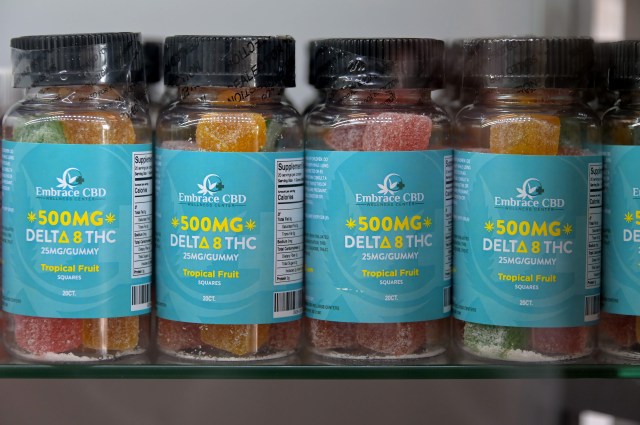New research from the Johns Hopkins University found the hemp-derived Delta-8-tetrahydrocannabinol to be less potent than Delta-9, the main psychoactive component in cannabis, when orally ingested, though the former can still produce similar psychoactive effects.
Delta-8 has grown in popularity as cannabis laws across the country have become less restrictive, allowing many smoke shops and dispensaries to legally sell additional products made from hemp.
Published this month by the International Society of Addiction Journal Editors, the clinical trial focused on 19 healthy adults with no past-month exposure to cannabinoids. Participants each ingested a brownie containing various doses of Delta-8 or Delta-9, or a placebo, with researchers recording cannabinoid concentration in blood, subjective drug effects, cognitive and psychomotor performance, and vital signs.
Delta-8 resulted in significantly lower ratings of drug effect than Delta-9 at a dose of 20 milligrams, the study found. Delta-8 was found to also have significantly lower cognitive impairment, negative subjective effects and impact on heart rate.
However, doubling the dose of Delta-8 to 40 milligrams resulted in the same rates of drug effects as 20 milligrams of Delta-9.
“This is noteworthy considering people who consume cannabis products generally perceive Delta 8-THC as less harmful or intoxicating than Delta 9-THC,” the study reads.
Both 20 milligrams and 40 milligrams of Delta 8 produced comparably positive subjective effects — referred to as “drug liking,” which is the pleasurable feeling a user gets when consuming a drug — to 20 milligrams of Delta-9, suggesting similar “misuse potential,” according to the research.
The clinical trial found also that cannabinoid blood concentration peaked between two and four hours post-dose and that psychoactive metabolites — chemical substances produced by the body to break down and process psychoactive drugs — were significantly lower in Delta-8 users than those of Delta-9 users at the same dose.
Psychoactive metabolites can have their own psychoactive effects that are different from the effects of the ingested THC, meaning they can lead to a different experience for someone with more of them present.
“These findings inform regulatory decisions and public education, though further research on emergent cannabinoids is needed,” the study reads.
The sale of Delta-8 products in Maryland was legalized in 2023 after a state judge ordered a temporary injunction, lifting a law that formerly banned retailing it.
There are more than 100 other cannabinoids found within the hemp plant. Through chemical treatments, processors can extract and synthesize some cannabinoids from hemp while removing others, allowing for a variety of different cannabinoids, such as Delta-8, Delta-10, and Cannabidiol. Cannabis has more than O.3% THC by dry weight, and hemp has less than 0.3% THC.
The Hopkins research was funded by the Substance Abuse and Mental Health Services Administration, a Maryland-based agency within the U.S. Department of Health and Human Services.
Hopkins is among the many research and educations institutions across the country facing funding cuts from the Trump administration‘s Department of Government Efficiency, potentially jeopardizing scientific research. The Baltimore institution, which receives more money from the National Institute of Health than any other institution — more than $1 billion last year alone — has joined litigation challenging the federal cuts.
Have a news tip? Contact Matt Hubbard at mhubbard@baltsun.com, 443-651-0101 or @mthubb on X.


